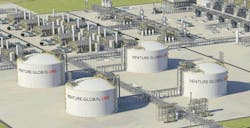Japanese energy firm signs 20-yr deal to acquire 1M tons of U.S. LNG annually
Japanese oil and gas exporter Inpex has signed an agreement with US-based Venture Global LNG to buy one million tons per annum of liquefied natural gas (LNG) for 20 years.
Under the agreement, Inpex’s Singapore-based subsidiary Inpex Energy Trading Singapore, will buy the U.S.-produced LNG from Venture Global’s third project CP2 LNG. Construction of the project, sited in Cameron Parish, Louisiana, is expected to commence in 2023.
“This agreement will enable the Inpex Group to procure LNG from the United States on a long-term basis, expand its LNG supply capacity, and diversify its supply sources to further contribute to the stable supply of energy,” said Hiroshi Kato, Executive Officer and Senior Vice President of Global Energy Marketing at Inpex.
With this agreement, Inpex joins other CP2 LNG customers including New Fortress Energy, EnBW, Chevron and ExxonMobil. Japan has a relatively low level of oil and gas reserves domestically, and thus imports more than 3 million barrels per day and about 95 percent of its natural gas needs, according to reports.
“Venture Global is delighted to welcome INPEX, Japan’s largest gas exploration and production company, as a customer at CP2 and expand our customer base in Asia,” said Venture Global CEO Mike Sabel. “We are honored to provide security of LNG supply to this key market and look forward to supporting INPEX as it delivers our competitive lower carbon energy to the region.”
Venture Global's first facility, Calcasieu Pass, commenced producing LNG in January 2022. The company is also constructing or developing an additional 60 million tons per annum of production capacity in Louisiana. Venture says it is also developing carbon capture and sequestration projects at each of its LNG facilities.
Inpex is currently involved in projects across multiple continents, including the Ichthys LNG Project in Australia as operator.
Record volumes of U.S.-produced natural gas, from plays such as the Permian Basin and Bakken Shale, are shipped by pipeline down to the Gulf Coast LNG terminals. They are liquified by chilling the gas to temperatures lower than minus 260 degrees Fahrenheit, which makes the gas stable and consensed for long-distance shipping.
Companies such as Sempra Infrastructure, JERA, Uniper and Cheniere Energy have built or are planning to build LNG terminals along the coast. The U.S. is the world's top LNG exporter this year with an estimated 11 billion cubic feet per day on average, according to reports.
About the Author
EnergyTech Staff
Rod Walton is head of content for EnergyTech.com. He has spent 17 years covering the energy industry as a newspaper and trade journalist.
Walton formerly was energy writer and business editor at the Tulsa World. Later, he spent six years covering the electricity power sector for Pennwell and Clarion Events. He joined Endeavor and EnergyTech in November 2021.
He can be reached at [email protected].
EnergyTech is focused on the mission critical and large-scale energy users and their sustainability and resiliency goals. These include the commercial and industrial sectors, as well as the military, universities, data centers and microgrids.
Many large-scale energy users such as Fortune 500 companies, and mission-critical users such as military bases, universities, healthcare facilities, public safety and data centers, shifting their energy priorities to reach net-zero carbon goals within the coming decades. These include plans for renewable energy power purchase agreements, but also on-site resiliency projects such as microgrids, combined heat and power, rooftop solar, energy storage, digitalization and building efficiency upgrades.
